Cremation, Caste, and Cosmogony in Karmic Traditions.
Cremation, Caste, and Cosmogony in Karmic Traditions.
Cremation, Caste, and Cosmogony in Karmic Traditions.
You also want an ePaper? Increase the reach of your titles
YUMPU automatically turns print PDFs into web optimized ePapers that Google loves.
Nigel Barley remarked <strong>in</strong> Danc<strong>in</strong>g on the Grave “…<strong>in</strong><br />
Africa, my constant presence at funerals was rapidly<br />
noted. “You are like a vulture”, one man remarked<br />
coolly. “I see you climb<strong>in</strong>g the hills <strong>and</strong> I know someone<br />
else must have gone” “(Barley 1995:13). Western<br />
attitudes towards death can be understood by a<br />
comparison with pornography, as po<strong>in</strong>ted out by<br />
Geoffrey Gorer; “<strong>in</strong> the twentieth century there seems to<br />
have been an unremarked shift <strong>in</strong> prudery; whereas<br />
copulation has become more <strong>and</strong> more mentionable,<br />
particularly <strong>in</strong> Anglo-Saxon societies, death has become<br />
more <strong>and</strong> more unmentionable” (Gorer 1965).<br />
Most people ask me, often with a petrified <strong>and</strong> an<br />
astonished disbelief, what it is like to study death. Death<br />
is allegedly someth<strong>in</strong>g one is not supposed to study or be<br />
concerned with, at least not from an academic po<strong>in</strong>t of<br />
view; only form a deep ontological search for the truth.<br />
So far I have witnessed or participated <strong>in</strong> approximately<br />
600 cremations, funerals, or observed exposed corpses <strong>in</strong><br />
various ways. Obviously, what it is like to study death is<br />
a major concern for me, which I have been constantly reth<strong>in</strong>k<strong>in</strong>g,<br />
<strong>and</strong> it raises both universal ethical questions <strong>in</strong><br />
general <strong>and</strong> research ethical questions <strong>in</strong> particular.<br />
Therefore, the answer to the question might be a bit<br />
surpris<strong>in</strong>g; it is quite easy to study death, I like it, it is<br />
not scary, rather the opposite, it is highly <strong>in</strong>terest<strong>in</strong>g, <strong>and</strong><br />
sometimes it might even be fun <strong>and</strong> a pleasant <strong>and</strong> social<br />
event (<strong>and</strong> a cold beer after many cremations, when the<br />
clothes are reek<strong>in</strong>g of burnt flesh, <strong>and</strong> ashes from the<br />
pyre are still <strong>in</strong> my hair, cannot taste better). Of course,<br />
there have been a lot of dreadful sights <strong>and</strong> awful smells<br />
at cemeteries, but personal emotions regard<strong>in</strong>g human<br />
decomposition is not a major part of research ethics<br />
regard<strong>in</strong>g death. However, the smells <strong>and</strong> sights are what<br />
shock most Western or Christian observers of death<br />
rituals s<strong>in</strong>ce we have been accustomed to live <strong>in</strong> a<br />
society without see<strong>in</strong>g dead people at all.<br />
My ethical concerns do not start at the cemetery, after<br />
all, when people f<strong>in</strong>ally arrive there as corpses they are<br />
dead. Hence, see<strong>in</strong>g dead people is not really a problem,<br />
<strong>and</strong> dy<strong>in</strong>g with one’s feet <strong>in</strong> the river <strong>and</strong> thereafter<br />
be<strong>in</strong>g cremated at Pashupat<strong>in</strong>ath where the ashes are<br />
scattered <strong>in</strong>to the river seems like quite an attractive <strong>and</strong><br />
a glamorous funeral, at least if the Bagmati River is<br />
clean. Thus, my ma<strong>in</strong> ethical concerns are not so much<br />
on the cemetery, but on the way to the cemetery. The<br />
miseries of the world evident <strong>in</strong> the poverty <strong>and</strong> the<br />
gutters people are crawl<strong>in</strong>g <strong>in</strong>, the crippled who beg for<br />
money <strong>and</strong> those without arms to carry the begg<strong>in</strong>g<br />
bowl, the sick <strong>and</strong> the <strong>in</strong>sane without any social<br />
networks, the street children without any opportunities;<br />
it is all these “almost” dead people who touch my ethical<br />
Appendix B<br />
Ethics <strong>and</strong> ethnography<br />
305<br />
consciousness. Those who are cremated at for <strong>in</strong>stance<br />
Pashupat<strong>in</strong>ath are fortunate for two reasons, firstly, they<br />
are dead <strong>and</strong> the suffer<strong>in</strong>gs <strong>in</strong> this world have ended, but<br />
more importantly, they have relatives who mourn their<br />
death, or <strong>in</strong> other words, they have had the possibility to<br />
be cremated at the most auspicious place <strong>in</strong> Nepal. The<br />
poorest do not even f<strong>in</strong>d salvation <strong>in</strong> death, <strong>and</strong> these are<br />
not given the last obsequies at Pashupat<strong>in</strong>ath unless<br />
some volunteer pays for their rituals, which only rarely<br />
happens.<br />
Thus, by participat<strong>in</strong>g <strong>in</strong> death rituals at Pashupat<strong>in</strong>ath<br />
one has bypassed the real problems <strong>in</strong> samsara – or the<br />
round of birth <strong>and</strong> death, <strong>and</strong> thereby all the ethical<br />
concerns regard<strong>in</strong>g the miseries of the world. In this<br />
sense there are some Christian <strong>and</strong> capitalistic<br />
projections when the attention is directed towards the<br />
dead <strong>and</strong> not how people are treated <strong>in</strong> this life. The<br />
truism <strong>in</strong> H<strong>in</strong>duism that death is life <strong>and</strong> life is death has<br />
become more evident for me, <strong>and</strong> the study of death has<br />
to be seen <strong>in</strong> relation to life. More important <strong>in</strong> this case,<br />
the ethics <strong>in</strong>volved <strong>in</strong> the study has to be adapted to the<br />
real world <strong>and</strong> to the descendants’ own perceptions <strong>and</strong><br />
emotions towards death. Start<strong>in</strong>g with the last first,<br />
namely emotions. Dist<strong>in</strong>guish<strong>in</strong>g different layers <strong>and</strong><br />
levels of <strong>in</strong>teract<strong>in</strong>g emotions, grieves, <strong>and</strong> personal<br />
motivations for perform<strong>in</strong>g various rites is a difficult<br />
task, <strong>and</strong> I will only emphasise that such perceptions are<br />
often determ<strong>in</strong><strong>in</strong>g <strong>and</strong> overpower<strong>in</strong>g both tradition <strong>and</strong><br />
religious structures, but at the same time they are<br />
dependent upon these structures. In some funerals the<br />
sons <strong>and</strong> daughters cry <strong>in</strong> despair <strong>and</strong> may collapse of<br />
sorrow; parents who mourn the loss of their children are<br />
emotionally touch<strong>in</strong>g everyone, <strong>and</strong> some react with<br />
hysteria to the death of their beloved. In such cases,<br />
which are the exceptions, <strong>in</strong>st<strong>in</strong>ctively one steps aside<br />
<strong>and</strong> refra<strong>in</strong>s from <strong>in</strong>terfer<strong>in</strong>g <strong>and</strong> ask<strong>in</strong>g questions.<br />
Everyone has feel<strong>in</strong>gs <strong>and</strong> grief for the social personae<br />
that is dead regardless of soteriology <strong>and</strong> religious<br />
explanations. Although it might be written <strong>in</strong> religious<br />
texts that cry<strong>in</strong>g <strong>and</strong> wail<strong>in</strong>g by the mourners is of no<br />
avail, “they should absta<strong>in</strong> from shedd<strong>in</strong>g tears while<br />
giv<strong>in</strong>g the water-offer<strong>in</strong>gs after cremation. But if they<br />
shed tears <strong>and</strong> vomit cough, the departed spirit consumes<br />
the same helplessly” (Garuda Purana II, II.4.80), often<br />
people express some feel<strong>in</strong>gs. In other cases I have been<br />
tempted to believe that the mourners were without<br />
emotions <strong>and</strong> did not care how the carcass was disposed<br />
of. In one cremation I witnessed, the majority of the<br />
funeral procession <strong>and</strong> all the sons except one were<br />
play<strong>in</strong>g cards, dr<strong>in</strong>k<strong>in</strong>g alcohol, <strong>and</strong> smok<strong>in</strong>g at the<br />
cemetery while their mother lay naked on the pyre <strong>in</strong> a,<br />
lets say, “gynaecological” position, <strong>and</strong> it did not look


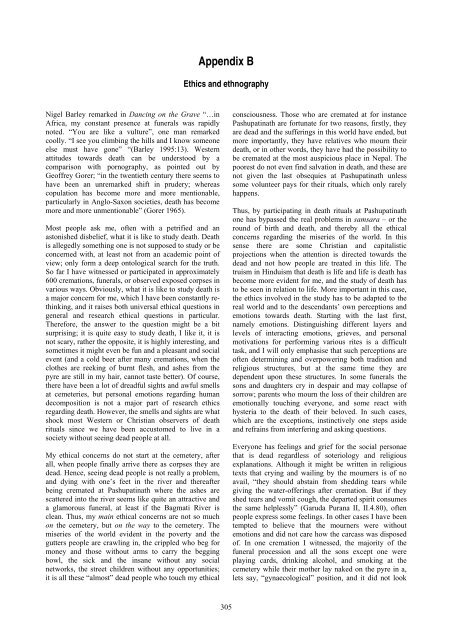
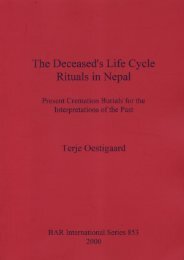


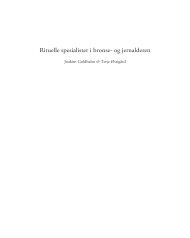
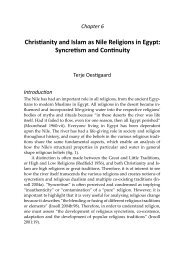
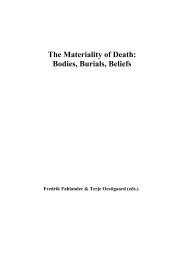


![Fullmono-AK [P2118].indd - oestigaard](https://img.yumpu.com/18994998/1/177x260/fullmono-ak-p2118indd-oestigaard.jpg?quality=85)